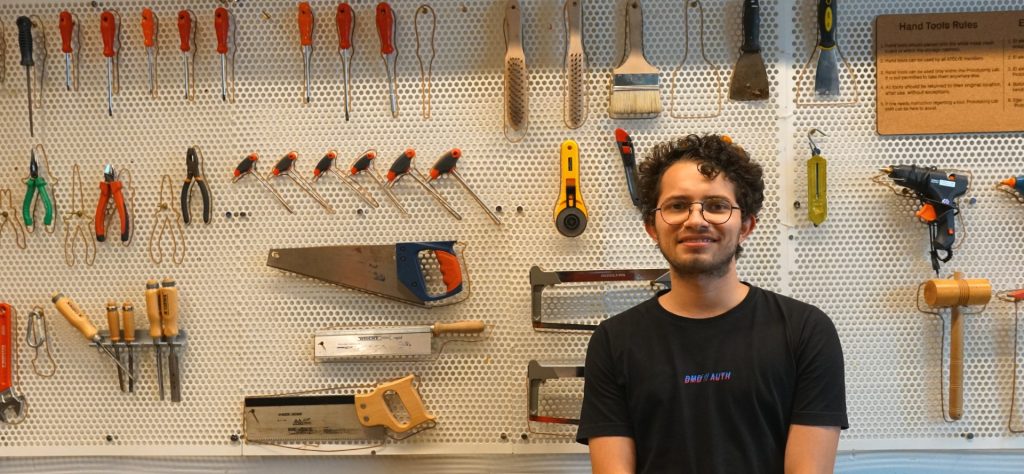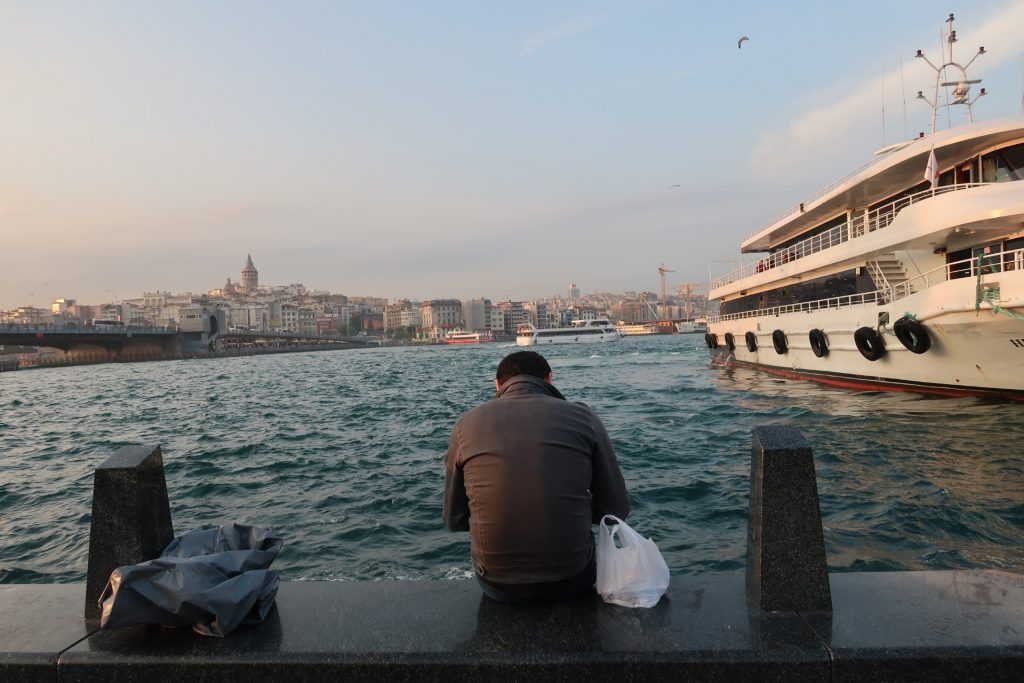One of the most enlightening aspects of spending time abroad is in realizing just how one’s own country portrays the events happening in other areas of the world. This is of course especially true, and often a point of major contention, for countries like Turkey. Jonathan Rios has witnessed this disparity firsthand time and time again in his many years outside his home of El Salvador. Throughout his various professional experiences that have taken him everywhere from America, to Mexico, Spain, India, and eventually Turkey, he’s remained conscious of how he and his part of the world has perceived these various cultures and the media portrayals thereof. Needless to say, that in the wake of the events and media narratives surrounding Turkey in 2016, with an insider’s perspective and having a network of contacts here, Jonathan was acutely aware of just how much of a need there is for a more personal, nuanced exchange of information from this region to Spanish speaking countries. Thus, Haber Latino was born in hopes of bringing Spanish speaking collaborators in Turkey, Lebanon, and the region at large together under a common mission. In doing so, Jonathan also hopes to allow for Spanish speaking media organizations to have access to qualified, capable individuals who can offer insightful perspectives on what’s really happening abroad. While the project is still in its early days, the guiding hands behind this new initiative are more than capable.
We took some time to speak with Jonathan about the experiences that drew him to Istanbul, the dissonance between media narratives at home and realities on the ground, the complexities of working on projects that bridge different regions of the world, and what’s next on the horizon for this proactive young journalist.

Could you tell us a little bit about yourself?
Where you come from is really important as it shapes how you perceive the world. I come from a very small city in El Salvador, which in itself is a very small country. My reality was very narrow you could say.
But I had the opportunity to study in the USA through a scholarship and after that, things just happened. As I had the privilege of not having to pay for school, it allowed me to think in ways that many people can’t. I didn’t owe anything to anybody, so I was able to do what I wanted. So that allowed me to collaborate on different projects. I worked in the health sector, in the education sector, in the technology sector – in India, Mexico, San Francisco, Barcelona, Istanbul and other places. I also started my own project in El Salvador as well.
How many years does that encompass?
It was around seven years, usually short term but for very specific projects. I approach them with a proposal, starting at this stage I’m able to help with these specific things. I know I will be able to get something from them, as I have a specific role I am interested in accomplishing. They as well obviously benefit. It’s a collaboration, but not really a typical job that happens.
How did you transition from that to living and working in Turkey?
One of those projects brought me to Istanbul in 2015. One thing led to another. We were doing consultancy for start ups at ITU Teknokent and that’s how I learned about Turkey. I wasn’t aware prior. Much like an average Turk wouldn’t know a lot about El Salvador, an average El Salvadorian wouldn’t know much about Turkey.
When I am looking for a project, I am trying to find something that inspires me. It’s more than just doing work for the sake of work and sustaining myself. I feel like I’m able to put the time in and not waste resources.
With Haber Latino, it was just an extension of that. Last time I was here in 2015, of all the friends I had made, only 15 or 20 percent had stayed behind after 2016 and the coup attempt that year. You ask them and they saw everything, and you realize what happened here.
So prior to relocating here I took a year as a digital nomad and came to visit and they were all talking about these issues. The perspective that we had been getting abroad was very biased – it comes with an American or European perspective. It wasn’t ‘us’ talking to ‘us’ about what’s really happening here.
It wasn’t just thoughts… these were first hand experiences. For example, the night of the coup the airport was closed and journalists weren’t able to come in. So TV networks were looking for people here on the ground. They ended up contacting a friend of mine who did some reporting. When she returned to Mexico, she was surprised to learn that they don’t have people on the ground in Turkey or Lebanon – they buy their news from networks like CNN.
So in looking at it, there’s both a business opportunity as well as a cultural opportunity – which is really important to us.
Could you also tell us a bit about the meaning behind the name and the mission?
So ‘haber’ is ‘news’ in Turkish, so that’s where we take it from, but ‘haber’ also sounds like ‘what’s being/happening?’ in Spanish, so that ties into it.
As for a mission, we want to be a communication bridge between our cultures. We want to build that direct connection without relying on anybody else to tell us what’s happening. We look at the stereotypes and for example, when people ask me ‘What are you doing in Turkey?’ or ‘What is Turkey like?’ – they have a narrow view and negative stereotypes. When we build this bridge we can learn from people here and vice versa. There are so many things we can share and we’re not taking advantage of that opportunity.

Who is your target audience?
We’re in the first stages at the moment. So we’re thinking university students and people with an interest in the area. All the content is in Spanish and hopefully Portuguese soon. We might translate content, but our vision is for the content to be in those two languages.
Who is involved in Haber Latino with you and what is your role?
Right now we’re three people who have started it. The three pillars of the ‘Why?’ – ‘Why do we want to do this?’ We’re creating content and at the moment our scope is Istanbul. Turkey and Istanbul are different so we’re curating content focused here.
Another aspect of the business model is to create a network of correspondents. So if a magazine in Colombia needs information on what’s happening here, they can use our network and find a correspondent in whatever country and gain that perspective. So we are working on recruiting people in the region – not only in Turkey but also the Middle East. Then we’ll also be able to diversify that content.
We’re at a slow pace right now, but that’s our focus. We’re in talks with people in Lebanon, a doctor who works in the Kurdish area of Iraq, etc. They have a lot to say and it’s not just about politics. Being a journalist is a double edged sword. We don’t want to be political and get into controversial stuff, but we do want to share what we are experiencing and what we see and how we can learn from each other.
Personally, I’m taking on a lot of content at the moment. Intersections of history, politics, and the economy. How small shifts and something as small as a .2 change in the Lira influences debate today and the reactions to that. I’m also working on expansion and finding people to recruit. I’m looking at our options and trying to understand what it is Haber Latino wants to communicate and what are our options in that.
How do you decide on what content to include? What’s the process of getting content published?
Right now we just want to present it as it goes and see what people have to say. From there, we’ll start building our shape. It’s not a trial process, but we do want to see what our writers have to say. It’s very open at the moment.
Right now, for example the doctor in the Kurdish area of Iraq – we’re asking what he wants for people to know and what would be beneficial to learn about the refugee issues in the area.
We have another guy who is Colombian who is covering Turks as an ethnicity. So it’s more about historical context.
Right now it’s open and we’ll see what people bring to the table.
How does ATÖLYE fit in?
ATÖLYE has a sister space in Barcelona – Makers of Barcelona. Through a collaboration between ATÖLYE and several European networks, I met Atılım from here and learned about the existence of this space. I first was living in Kadıköy and it was hard to come, but now I’m living in Şişli and I just want to be around everything that’s happening here. It’s a creative community, people who are thinking forward – it’s outside the box and not a normal job. That’s how I felt with the community in Barcelona and now I’m feeling it here as well. It’s definitely one of the best things.
What are some of the bigger challenges in your work?
In Latin America, we consider ourselves open minded, but we don’t realize we can be racist or otherwise. When you think racism you think about the USA. But in Latin America, we’re not challenged. You don’t interact with other ethnicities or religions. In my country there are just two mosques. Muslims are often perceived to be wrong or bad. We want to test those limits and that openness. We have a lot of things in common and things we haven’t deal with, so we want to see how our community responds to that.
Any big plans in the months ahead? What are some of your immediate objectives?
The big thing is covering more countries and diversifying that way. Right now it’s very Turkey focused. It’s starting to feel more like a Turkey-Latin America publication and that’s it. So we want to diversify. I’m an economist, my friend is a historian and has been working on political leftist movements in Latin America. Our third friend is a journalist, and between us, our scope of perspectives can only take us so far. Hopefully with more people being involved, we’ll be able to see what direction and shape we’ll take the project to.
How can someone participate in the project?
They just need to contact us. We’re very open at the moment. In building this communication bridge we don’t know what it looks like just yet. We want to build it and see where it goes.
As we’re a publication for foreigners, any final words of advice or places to visit for people looking to make the most out of their time here in Istanbul?
Definitely just walk around and get out of the touristy areas. Get off at a random metro station and see the diversity of Istanbul. I love the city, but that includes its flaws. I’ve seen the really good and really bad. I see the beauty in that.
To keep up with Jonathan and his work, keep an eye on the official page for Haber Latino and their Instagram.
ATÖLYE Spotlight is our series on the inspiring community members of Istanbul’s most creative space.
All images courtesy of the interviewee.









